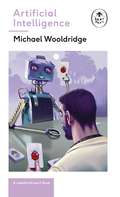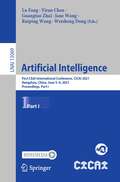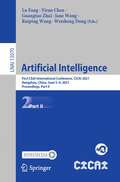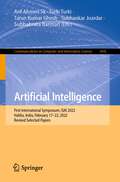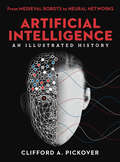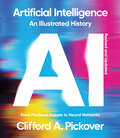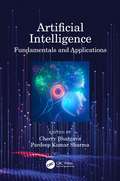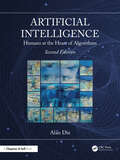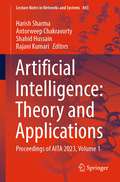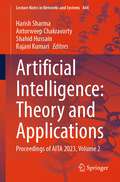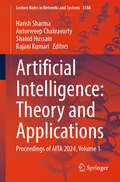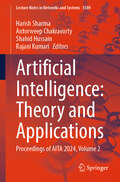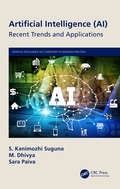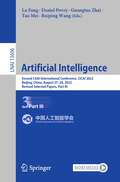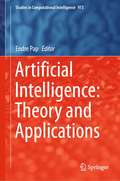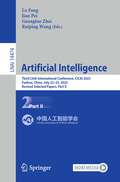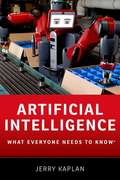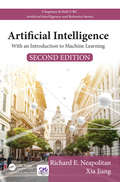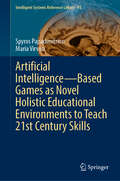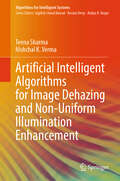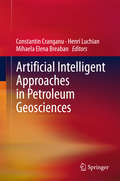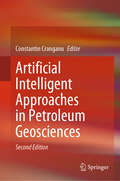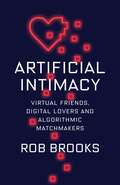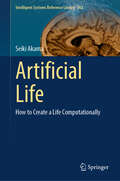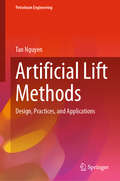- Table View
- List View
Artificial Intelligence: Everything you need to know about the coming AI. A Ladybird Expert Book (The Ladybird Expert Series #27)
by Michael Wooldridge'I propose to consider the question, 'Can machines think?' Alan Turing (1950)Part of the ALL-NEW Ladybird Expert series.This book is for everyone living in the age of Artificial Intelligence. And this is an accessible and authoritative introduction to one of the most important conversations of our time . . . Written by computer scientist Michael Wooldridge, Artificial Intelligence chronicles the development of intelligent machines, from Turing's dream of machines that think, to today's digital assistants like Siri and Alexa. AI is not something that awaits us in the future. Inside you'll learn how we have come to rely on embedded AI software and what a world of ubiquitous AI might look like.What's inside?- The British mathematician Alan Turing- Can machines 'understand'?- Logical and Behavioural AI- The reality of AI today- AI tomorrow- And much more . . . For an adult readership, the Ladybird Expert series is produced in the same iconic small hardback format pioneered by the original Ladybirds. Each beautifully illustrated book features the first new illustrations produced in the original Ladybird style for nearly forty years.
Artificial Intelligence: First CAAI International Conference, CICAI 2021, Hangzhou, China, June 5–6, 2021, Proceedings, Part I (Lecture Notes in Computer Science #13069)
by Guangtao Zhai Jane Wang Yiran Chen Lu Fang Ruiping Wang Weisheng DongThis two-volume set LNCS 13069-13070 constitutes selected papers presented at the First CAAI International Conference on Artificial Intelligence, held in Hangzhou, China, in June 2021. Due to the COVID-19 pandemic the conference was partially held online. The 105 papers were thoroughly reviewed and selected from 307 qualified submissions. The papers are organized in topical sections on applications of AI; computer vision; data mining; explainability, understandability, and verifiability of AI; machine learning; natural language processing; robotics; and other AI related topics.
Artificial Intelligence: First CAAI International Conference, CICAI 2021, Hangzhou, China, June 5–6, 2021, Proceedings, Part II (Lecture Notes in Computer Science #13070)
by Guangtao Zhai Jane Wang Yiran Chen Lu Fang Ruiping Wang Weisheng DongThis two-volume set LNCS 13069-13070 constitutes selected papers presented at the First CAAI International Conference on Artificial Intelligence, held in Hangzhou, China, in June 2021. Due to the COVID-19 pandemic the conference was partially held online. The 105 papers were thoroughly reviewed and selected from 307 qualified submissions. The papers are organized in topical sections on applications of AI; computer vision; data mining; explainability, understandability, and verifiability of AI; machine learning; natural language processing; robotics; and other AI related topics.
Artificial Intelligence: First International Symposium, ISAI 2022, Haldia, India, February 17-22, 2022, Revised Selected Papers (Communications in Computer and Information Science #1695)
by Arif Ahmed Sk Turki Turki Tarun Kumar Ghosh Subhankar Joardar Subhabrata BarmanThis book constitutes the refereed proceedings of the First International Symposium on Artificial Intelligence, ISAI 2022, held in Haldia, India, during February 17-22, 2022. The 30 full papers included in this book were carefully reviewed and selected from 75 submissions. They were organized in topical sections as follows: information systems, mathematics and data analyses; and applied artificial intelligence..
Artificial Intelligence: From Medieval Robots to Neural Networks (Union Square & Co. Illustrated Histories)
by Clifford A. Pickover“This is an addictive stroll through the annals of artificial intelligence, highlighting almost 100 innovations developed between 1300 BCE and 2018” (Booklist).From medieval robots and Boolean algebra to facial recognition, artificial neural networks, and adversarial patches, this fascinating history takes readers on a lively tour through the world of artificial intelligence. Award–winning author Clifford A. Pickover (The Math Book, The Physics Book, Death & the Afterlife) explores the historic and current applications of AI in such diverse fields as computing, medicine, popular culture, mythology, and philosophy, and considers the enduring threat to humanity should AI grow out of control. Across 100 illustrated entries, Pickover provides an entertaining and informative look into when artificial intelligence began, how it developed, where it’s going, and what it means for the future of human-machine interaction.“An enjoyable diversion to read cover to cover, follow along common strands, or dip into for random bits.” —Booklist
Artificial Intelligence: From Medieval Robots to Neural Networks (Union Square & Co. Illustrated Histories)
by Clifford A. PickoverA History of the Future that's Happening Right NowArtificial Intelligence: An Illustrated History explores the historic origins and current applications of AI in such diverse fields as computing, medicine, popular culture, mythology, and philosophy. Through more than 100 entries, award-winning author Clifford A. Pickover, offers a granular, yet accessible, glimpse into the world of AI—from medieval robots and Boolean algebra to facial recognition, and artificial neural networks. First released in 2019, this updated paperback edition brings readers up to speed with coverage of technologies such as DALL-E and ChatGPT, and it explores the very real fear that AI will alter the course of humanity—forever.
Artificial Intelligence: Fundamentals and Applications
by Cherry Bhargava Pradeep Kumar SharmaThis comprehensive reference text discusses the fundamental concepts of artificial intelligence and its applications in a single volume. Artificial Intelligence: Fundamentals and Applications presents a detailed discussion of basic aspects and ethics in the field of artificial intelligence and its applications in areas, including electronic devices and systems, consumer electronics, automobile engineering, manufacturing, robotics and automation, agriculture, banking, and predictive analysis. Aimed at senior undergraduate and graduate students in the field of electrical engineering, electronics engineering, manufacturing engineering, pharmacy, and healthcare, this text: Discusses advances in artificial intelligence and its applications. Presents the predictive analysis and data analysis using artificial intelligence. Covers the algorithms and pseudo-codes for different domains. Discusses the latest development of artificial intelligence in the field of practical speech recognition, machine translation, autonomous vehicles, and household robotics. Covers the applications of artificial intelligence in fields, including pharmacy and healthcare, electronic devices and systems, manufacturing, consumer electronics, and robotics.
Artificial Intelligence: Humans at the Heart of Algorithms
by Alan DixAn authoritative and accessible one-stop resource, the first edition of An Introduction to Artificial Intelligence presented one of the first comprehensive examinations of AI. Designed to provide an understanding of the foundations of artificial intelligence, it examined the central computational techniques employed by AI, including knowledge representation, search, reasoning and learning, as well as the principal application domains of expert systems, natural language, vision, robotics, software agents and cognitive modelling. Many of the major philosophical and ethical issues of AI were also introduced. This new edition expands and revises the book throughout, with new material to augment existing chapters, including short case studies, as well as adding new chapters on explainable AI, big data and deep learning, temporal and web-scale data, statistical methods and data wrangling. It expands the book’s focus on human-centred AI, covering gender, ethnic and social bias, the need for transparency, intelligent user interfaces, and designing interactions to aid machine learning. With detailed, well-illustrated examples and exercises throughout, this book provides a substantial and robust introduction to artificial intelligence in a clear and concise coursebook form. It stands as a core text for all students and computer scientists approaching AI.You can also visit the author website for further resources: https://alandix.com/aibook/.
Artificial Intelligence: Proceedings of AITA 2023, Volume 1 (Lecture Notes in Networks and Systems #843)
by Shahid Hussain Harish Sharma Antorweep Chakravorty Rajani KumariThis book features a collection of high-quality research papers presented at International Conference on Artificial Intelligence: Theory and Applications (AITA 2023), held during 11–12 August 2023 in Bengaluru, India. The book is divided into two volumes and presents original research and review papers related to artificial intelligence and its applications in various domains including health care, finance, transportation, education, and many more.
Artificial Intelligence: Proceedings of AITA 2023, Volume 2 (Lecture Notes in Networks and Systems #844)
by Shahid Hussain Harish Sharma Antorweep Chakravorty Rajani KumariThis book features a collection of high-quality research papers presented at International Conference on Artificial Intelligence: Theory and Applications (AITA 2023), held during 11–12 August 2023 in Bengaluru, India. The book is divided into two volumes and presents original research and review papers related to artificial intelligence and its applications in various domains including health care, finance, transportation, education, and many more.
Artificial Intelligence: Proceedings of AITA 2024, Volume 1 (Lecture Notes in Networks and Systems #5588)
by Shahid Hussain Harish Sharma Antorweep Chakravorty Rajani KumariThis book features a collection of high-quality research papers presented at International Conference on Artificial Intelligence: Theory and Applications (AITA 2024), held during 9–10 August 2024 in Bengaluru, India. The book is divided into two volumes and presents original research and review papers related to artificial intelligence and its applications in various domains including health care, finance, transportation, education, and many more.
Artificial Intelligence: Proceedings of AITA 2024, Volume 2 (Lecture Notes in Networks and Systems #5589)
by Shahid Hussain Harish Sharma Antorweep Chakravorty Rajani KumariThis book features a collection of high-quality research papers presented at International Conference on Artificial Intelligence: Theory and Applications (AITA 2024), held during 9–10 August 2024 in Bengaluru, India. The book is divided into two volumes and presents original research and review papers related to artificial intelligence and its applications in various domains including health care, finance, transportation, education, and many more.
Artificial Intelligence: Recent Trends and Applications (Artificial Intelligence (AI): Elementary to Advanced Practices)
by S. Kanimozhi Suguna, M. Dhivya, and Sara PaivaThis book aims to bring together leading academic scientists, researchers, and research scholars to exchange and share their experiences and research results on all aspects of Artificial Intelligence. The book provides a premier interdisciplinary platform to present practical challenges and adopted solutions. The book addresses the complete functional framework workflow in Artificial Intelligence technology. It explores the basic and high-level concepts and can serve as a manual for the industry for beginners and the more advanced. It covers intelligent and automated systems and its implications to the real-world, and offers data acquisition and case studies related to data-intensive technologies in AI-based applications. The book will be of interest to researchers, professionals, scientists, professors, students of computer science engineering, electronics and communications, as well as information technology.
Artificial Intelligence: Second CAAI International Conference, CICAI 2022, Beijing, China, August 27–28, 2022, Revised Selected Papers, Part III (Lecture Notes in Computer Science #13606)
by Guangtao Zhai Tao Mei Lu Fang Ruiping Wang Daniel PoveyThis three-volume set LNCS 13604-13606 constitutes revised selected papers presented at the Second CAAI International Conference on Artificial Intelligence, held in Beijing, China, in August 2022. CICAI is a summit forum in the field of artificial intelligence and the 2022 forum was hosted by Chinese Association for Artificial Intelligence (CAAI). The 164 papers were thoroughly reviewed and selected from 521 submissions. CICAI aims to establish a global platform for international academic exchange, promote advanced research in AI and its affiliated disciplines such as machine learning, computer vision, natural language, processing, and data mining, amongst others.
Artificial Intelligence: Theory and Applications (Studies in Computational Intelligence #973)
by Endre PapThis book is an up-to-date collection, in AI and environmental research, related to the project ATLAS. AI is used for gaining an understanding of complex research phenomena in the environmental sciences, encompassing heterogeneous, noisy, inaccurate, uncertain, diverse spatio-temporal data and processes. The first part of the book covers new mathematics in the field of AI: aggregation functions with special classes such as triangular norms and copulas, pseudo-analysis, and the introduction to fuzzy systems and decision making. Generalizations of the Choquet integral with applications in decision making as CPT are presented. The second part of the book is devoted to AI in the geo-referenced air pollutants and meteorological data, image processing, machine learning, neural networks, swarm intelligence, robotics, mental well-being and data entry errors. The book is intended for researchers in AI and experts in environmental sciences as well as for Ph.D. students.
Artificial Intelligence: Third CAAI International Conference, CICAI 2023, Fuzhou, China, July 22–23, 2023, Revised Selected Papers, Part II (Lecture Notes in Computer Science #14474)
by Guangtao Zhai Jian Pei Lu Fang Ruiping WangThis two-volume set LNAI 14473-14474 constitutes revised selected papers presented at the Third CAAI International Conference, CICAI 2023, in Fuzhou, China, in July 2023. CICAI is a summit forum in the field of artificial intelligence and the 2023 forum was hosted by Chinese Association for Artificial Intelligence (CAAI). The 100 papers were thoroughly reviewed and selected from 376 submissions. CICAI 2023 conference covers a wide range of of AI generated content, computer vision, machine learning, nature language processing, application of AI, and data mining, amongst others.
Artificial Intelligence: What Everyone Needs to Know
by Jerry KaplanOver the coming decades, Artificial Intelligence will profoundly impact the way we live, work, wage war, play, seek a mate, educate our young, and care for our elderly. It is likely to greatly increase our aggregate wealth, but it will also upend our labor markets, reshuffle our social order, and strain our private and public institutions. Eventually it may alter how we see our place in the universe, as machines pursue goals independent of their creators and outperform us in domains previously believed to be the sole dominion of humans. Whether we regard them as conscious or unwitting, revere them as a new form of life or dismiss them as mere clever appliances, is beside the point. They are likely to play an increasingly critical and intimate role in many aspects of our lives. The emergence of systems capable of independent reasoning and action raises serious questions about just whose interests they are permitted to serve, and what limits our society should place on their creation and use. Deep ethical questions that have bedeviled philosophers for ages will suddenly arrive on the steps of our courthouses. Can a machine be held accountable for its actions? Should intelligent systems enjoy independent rights and responsibilities, or are they simple property? Who should be held responsible when a self-driving car kills a pedestrian? Can your personal robot hold your place in line, or be compelled to testify against you? If it turns out to be possible to upload your mind into a machine, is that still you? The answers may surprise you.
Artificial Intelligence: With an Introduction to Machine Learning (Second Edition) (Chapman & Hall/CRC Artificial Intelligence and Robotics Series)
by Richard E. Neapolitan Xia JiangThe first edition of this popular textbook, Contemporary Artificial Intelligence, provided an accessible and student friendly introduction to AI. This fully revised and expanded update, Artificial Intelligence: With an Introduction to Machine Learning, Second Edition, retains the same accessibility and problem-solving approach, while providing new material and methods. The book is divided into five sections that focus on the most useful techniques that have emerged from AI. The first section of the book covers logic-based methods, while the second section focuses on probability-based methods. Emergent intelligence is featured in the third section and explores evolutionary computation and methods based on swarm intelligence. The newest section comes next and provides a detailed overview of neural networks and deep learning. The final section of the book focuses on natural language understanding. Suitable for undergraduate and beginning graduate students, this class-tested textbook provides students and other readers with key AI methods and algorithms for solving challenging problems involving systems that behave intelligently in specialized domains such as medical and software diagnostics, financial decision making, speech and text recognition, genetic analysis, and more.
Artificial Intelligence—Based Games as Novel Holistic Educational Environments to Teach 21st Century Skills (Intelligent Systems Reference Library #93)
by Maria Virvou Spyros PapadimitriouThis book offers a visionary look at how AI can promote learning for modern skillsets by examining the fusion of AI, prosocial gaming, personalisation, ethics, and education. The book introduces the EPATHLO Suite, a novel AI platform that personalises both educational content and gameplay, creating tailor-made learning experiences and entertainment for each student. By blending personalised games with education, these AI-driven environments make learning more dynamic and enjoyable, while focusing on prosocial behaviour development, encouraging cooperation, empathy, and ethical understanding. It also provides roles for human teachers, as content creators of the EPATHLO Suite authoring tool. The book highlights the importance of twenty-first-century skills—such as critical thinking, collaboration, communication, and creativity—while also addressing ethical issues like data privacy (including GDPR compliance). It provides practical AI-driven solutions and reviews relevant literature, offering a comprehensive understanding of these interconnected fields. This book is an indispensable resource for those looking to explore these state-of-the-art topics. It is ideal for academics, researchers, students, educators, game designers, programmers, and professionals in the educational gaming industry who want to understand AI's role in shaping the future of education with games. Whether readers aim to enhance their classroom, develop new learning technologies, or better grasp the evolving technology of educational games with AI, this book offers valuable knowledge and practical tools for success.
Artificial Intelligent Algorithms for Image Dehazing and Non-Uniform Illumination Enhancement (Algorithms for Intelligent Systems)
by Nishchal K. Verma Teena SharmaThis book offers a detailed insight of artificial intelligence (AI) algorithms for image dehazing and non-uniform illumination enhancement. In this book, various image enhancement techniques under hazy and non-uniform illumination conditions are discussed. The book specifically provides a detail on how to approach image enhancement under different outdoor conditions using AI tools. The biggest benefit a reader would accrue is to get exposed to the various aspects one should take care of while working with digital images. The book also includes multiple inventions which were recently introduced by the authors for image enhancement and reviews the state of the art in respective subject matters.
Artificial Intelligent Approaches in Petroleum Geosciences
by Constantin Cranganu Henri Luchian Mihaela Elena BreabanThis book presents several intelligent approaches for tackling and solving challenging practical problems facing those in the petroleum geosciences and petroleum industry. Written by experienced academics, this book offers state-of-the-art working examples and provides the reader with exposure to the latest developments in the field of intelligent methods applied to oil and gas research, exploration and production. It also analyzes the strengths and weaknesses of each method presented using benchmarking, whilst also emphasizing essential parameters such as robustness, accuracy, speed of convergence, computer time, overlearning and the role of normalization. The intelligent approaches presented include artificial neural networks, fuzzy logic, active learning method, genetic algorithms and support vector machines, amongst others. Integration, handling data of immense size and uncertainty, and dealing with risk management are among crucial issues in petroleum geosciences. The problems we have to solve in this domain are becoming too complex to rely on a single discipline for effective solutions and the costs associated with poor predictions (e. g. dry holes) increase. Therefore, there is a need to establish a new approach aimed at proper integration of disciplines (such as petroleum engineering, geology, geophysics and geochemistry), data fusion, risk reduction and uncertainty management. These intelligent techniques can be used for uncertainty analysis, risk assessment, data fusion and mining, data analysis and interpretation, and knowledge discovery, from diverse data such as 3-D seismic, geological data, well logging, and production data. This book is intended for petroleum scientists, data miners, data scientists and professionals and post-graduate students involved in petroleum industry.
Artificial Intelligent Approaches in Petroleum Geosciences
by Constantin CranganuThis book presents cutting-edge approaches to solving practical problems faced by professionals in the petroleum industry and geosciences. With various state-of-the-art working examples from experienced academics, the book offers an exposure to the latest developments in intelligent methods for oil and gas research, exploration, and production. This second edition is updated with new chapters on machine learning approaches, data-driven modelling techniques, and neural networks. The book delves into machine learning approaches, including evolutionary algorithms, swarm intelligence, fuzzy logic, deep artificial neural networks, KNN, decision tree, random forest, XGBoost, and LightGBM. it also analyzes the strengths and weaknesses of each method and emphasizes essential parameters like robustness, accuracy, speed of convergence, computer time, overlearning, and normalization. Integration, data handling, risk management, and uncertainty management are all crucial issues in petroleum geosciences. The complexities of these problems require a multidisciplinary approach that fuses petroleum engineering, geology, geophysics, and geochemistry. Essentially, this book presents an approach for integrating various disciplines such as data fusion, risk reduction, and uncertainty management. Whether you are a professional or a student, you can greatly benefit from the latest advancements in intelligent methods applied to oil and gas research. This comprehensive and updated book presents cutting-edge approaches and real-world examples that can help you in solving the intricate challenges of the petroleum industry and geosciences.
Artificial Intimacy: Virtual Friends, Digital Lovers, and Algorithmic Matchmakers
by Rob BrooksWhat happens when the human brain, which evolved over eons, collides with twenty-first-century technology? Machines can now push psychological buttons, stimulating and sometimes exploiting the ways people make friends, gossip with neighbors, and grow intimate with lovers. Sex robots present the humanoid face of this technological revolution—yet although it is easy to gawk at their uncanniness, more familiar technologies based in artificial intelligence and virtual reality are insinuating themselves into human interactions. Digital lovers, virtual friends, and algorithmic matchmakers help us manage our feelings in a world of cognitive overload. Will these machines, fueled by masses of user data and powered by algorithms that learn all the time, transform the quality of human life?Artificial Intimacy offers an innovative perspective on the possibilities of the present and near future. The evolutionary biologist Rob Brooks explores the latest research on intimacy and desire to consider the interaction of new technologies and fundamental human behaviors. He details how existing artificial intelligences can already learn and exploit human social needs—and are getting better at what they do. Brooks combines an understanding of core human traits from evolutionary biology with analysis of how cultural, economic, and technological contexts shape the ways people express them. Beyond the technology, he asks what the implications of artificial intimacy will be for how we understand ourselves.
Artificial Life: How to Create a Life Computationally (Intelligent Systems Reference Library #262)
by Seiki AkamaThis book provides some resources of Artificial Life. Artificial Life (ALife or A-Life) is the research area which simulates a life computationally. It involves several approaches to living systems in artificial manners. It was recognized as a scientific field in the 1980's. Artificial Life is related to many scientific fields including biology and computer science, and its history is old. In fact, the earlier works have been done by people like Turing and von Neumann. Fields like that neural networks, evolutionary computation, and cellular automaton constitute the foundations for Artificial Life. The so-called wet ware is an approach in more biology-oriented, which is known that there are some Artificial Life Systems at present. It is expected to see further progresses of this exciting field. The materials include: history, philosophy, related areas, recent developments, etc. Starting from the overview, the authors give an exposition of basic subjects like cellular automaton, neural networks, evolutionary computation, and wet ware. The authors also introduce some examples of Artificial Life Systems like Boids, Tierra, and Open Warm. The book is intended for those, like experts and students, who wish to get involved in the field as a monograph or a textbook for the subject. It is also useful for beginners. But, the authors assume that the reader has mastered the material ordinarily covered in AI and mathematics.
Artificial Lift Methods: Design, Practices, and Applications (Petroleum Engineering)
by Tan NguyenThis book details the major artificial lift methods that can be applied to hydrocarbon reservoirs with declining pressure. These include: the sucker rod pump, gas lift, electrical submersible pump, progressive cavity pump, and plunger lift. The design and applications, as well as troubleshooting, are discussed for each method, and examples, exercises and design projects are provided in order to support the concepts discussed in each chapter. The problems associated with oil recovery in horizontal wells are also explored, and the author proposes solutions to address the various extraction challenges that these wells present. The book represents a timely response to the difficulties associated with unconventional oil sources and declining wells, offering a valuable resource for students of petroleum engineering, as well as hydrocarbon recovery researchers and practicing engineers in the petroleum industry.
